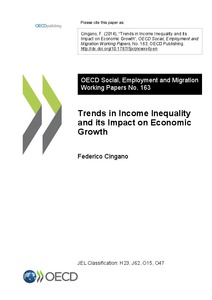Trends in income inequality and its impact on economic growth
"In most OECD countries, the gap between rich and poor is at its highest level since 30 years. Today, the richest 10 per cent of the population in the OECD area earn 9.5 times the income of the poorest 10 per cent; in the 1980s this ratio stood at 7:1 and has been rising continuously ever since...
| Main Author: | |
|---|---|
| Institution: | ETUI-European Trade Union Institute |
| Format: | TEXT |
| Language: | English |
| Published: |
Paris
2014
OECD |
| Subjects: | |
| Online Access: | https://www.labourline.org/KENTIKA-19115305124919335879-Trends-in-income-inequality-an.htm |
| _version_ | 1771659900208807938 |
|---|---|
| author | Cingano, Federico |
| author_facet | Cingano, Federico |
| collection | Library items |
| description | "In most OECD countries, the gap between rich and poor is at its highest level since 30 years. Today, the richest 10 per cent of the population in the OECD area earn 9.5 times the income of the poorest 10 per cent; in the 1980s this ratio stood at 7:1 and has been rising continuously ever since. However, the rise in overall income inequality is not (only) about surging top income shares: often, incomes at the bottom grew much slower during the prosperous years and fell during downturns, putting relative (and in some countries, absolute) income poverty on the radar of policy concerns. This paper explores whether such developments may have an impact on economic performance.
Drawing on harmonised data covering the OECD countries over the past 30 years, the econometric analysis suggests that income inequality has a negative and statistically significant impact on subsequent growth. In particular, what matters most is the gap between low income households and the rest of the population. In contrast, no evidence is found that those with high incomes pulling away from the rest of the population harms growth. The paper also evaluates the "human capital accumulation theory" finding evidence for human capital as a channel through which inequality may affect growth. Analysis based on micro data from the Adult Skills Survey (PIAAC) shows that increased income disparities depress skills development among individuals with poorer parental education background, both in terms of the quantity of education attained (e.g. years of schooling), and in terms of its quality (i.e. skill proficiency). Educational outcomes of individuals from richer backgrounds, however, are not affected by inequality.
It follows that policies to reduce income inequalities should not only be pursued to improve social outcomes but also to sustain long-term growth. Redistribution policies via taxes and transfers are a key tool to ensure the benefits of growth are more broadly distributed and the results suggest they need not be expected to undermine growth. But it is also important to promote equality of opportunity in access to and quality of education. This implies a focus on families with children and youths – as this is when decisions about human capital accumulation are made -- promoting employment for disadvantaged groups through active labour market policies, childcare supports and in-work benefits." |
| format | TEXT |
| geographic | OECD countries |
| id | 19115305124919335879_fb6faf21b25842db9c06a4a519872557 |
| institution | ETUI-European Trade Union Institute |
| is_hierarchy_id | 19115305124919335879_fb6faf21b25842db9c06a4a519872557 |
| is_hierarchy_title | Trends in income inequality and its impact on economic growth |
| language | English |
| physical | 65 p. Digital |
| publishDate | 2014 |
| publisher | Paris OECD |
| spellingShingle | Cingano, Federico economic growth income distribution social protection social inequality Trends in income inequality and its impact on economic growth |
| thumbnail | https://www.labourline.org/Image_prev.jpg?Archive=108507992678 |
| title | Trends in income inequality and its impact on economic growth |
| topic | economic growth income distribution social protection social inequality |
| url | https://www.labourline.org/KENTIKA-19115305124919335879-Trends-in-income-inequality-an.htm |

